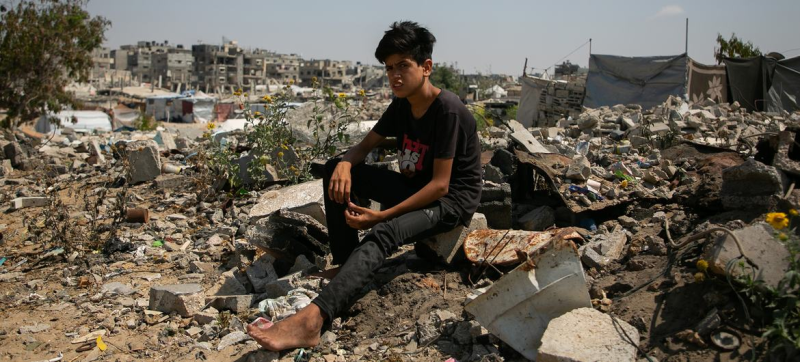- Puppet show enchants Children as Boi Mela comes alive on day 2 |
- DSCC Admin Salam’s drive to make South Dhaka a ‘clean city’ |
- 274 Taliban Dead, 55 Pakistan Troops Killed |
- Now 'open war' with Afghanistan after latest strikes |
- Dhaka's air quality fourth worst in world on Friday morning |
Gaza Evacuation Adds to Crisis as Fuel, Aid, and Water Scarce

A young man sits atop the rubble of a home in Gaza. Basic services including healthcare and clean water are increasingly difficult to provide, say UN aid agencies.
New evacuation orders in Gaza, issued by the Israeli military, have uprooted tens of thousands of Palestinians amid ongoing bombardment, aid agencies have warned.
Those affected by the orders have been told to relocate to the “already overcrowded” coastal strip at Al Mawasi, according to the UN Office for the Coordination of Humanitarian Affairs (OCHA), late Tuesday.
Al Mawasi, near Khan Younis, lacks “the basics for survival”, the UN agency insisted. It has also witnessed nearly two dozen strikes on displaced Gazans sheltering in tents there between 18 March and 11 April, the UN human rights office said.
As the war drags into its 21st month, Gaza’s most vulnerable people continue to struggle to survive.
They include Musbah Zaqqout, 70, one of 230 patients receiving lifesaving dialysis at Al-Shifa Hospital in Gaza City. His treatment has been disrupted by persistent supply shortages, which reduced sessions from three to two per week at the end of last month, the UN World Health Organization (WHO) warned on Tuesday.
“He suffered a lot when dialysis was not available,” said Mr. Zaqqout’s wife, Saadia. “He was suffocating and was frequently admitted to the hospital, to the point where he fell into a coma, lost focus, and didn’t recognize anyone.”
With support from partner organisation KS Relief, WHO delivered dialysis supplies and fuel to Al-Shifa Hospital so that it could resume dialysis treatment and other lifesaving services.
“Thank God, after restarting dialysis, his condition improved,” Mrs. Zaqqout said, while the UN health agency reiterated its calls for sustained entry of food, fuel, and health aid at scale through all possible routes.
“Critical shortages of fuel and medical supplies persist across Gaza,” WHO warned. “Without urgent and sustained replenishment, healthcare services risk coming to a grinding halt.”
Echoing those concerns, the UN agency for Palestinians, UNRWA, warned on Wednesday that it is increasingly difficult to help Gazans. Already, one in 10 children brought to its clinics suffers from malnutrition — a condition unheard of in the enclave before the war, but which more than doubled in children under five between March and June, amid the near-total Israeli siege.
“It’s becoming more and more difficult for us to continue providing services,” said UNRWA’s Louise Wateridge. “At least 188 UNRWA installations — over half of all our installations in the Gaza Strip — are located within the Israeli-militarized zone, under displacement orders, or where these overlap.”
In an update, Ms. Wateridge said that only six UNRWA health centres and 22 of the agency’s medical points remain operational today, in addition to 22 mobile medical points inside and outside shelters.
Nearly 60 per cent of essential medical supplies are now out of stock, according to the UN agency. “Children are dying before our eyes, because we do not have the medical supplies or sustained food to treat them,” it said.
As a direct result of the Israeli blockade on Gaza, which began on 2 March, UNRWA said that it has “now run out of” medicines for high blood pressure, antiparasitic and antifungal treatments, eye infection medicines, all skin treatments, and oral antibiotics for adults.
Providing clean water to the war-shattered enclave remains a massive challenge, with only two of UNRWA's main water wells still functioning. Ten were operational before the war. Another 41 smaller wells are operational in UNRWA shelters.
For the past two months in north Gaza, UNRWA has been forced to stop providing water and sanitation services for around 25,000 displaced people in shelters, owing to displacement orders issued by Israeli forces.
“The restrictions on the entry of fuel continue, placing life-saving services at severe risk,” the UN agency said. “Critical water services are at risk of shutting down if sustained fuel supplies are not permitted entry.”

